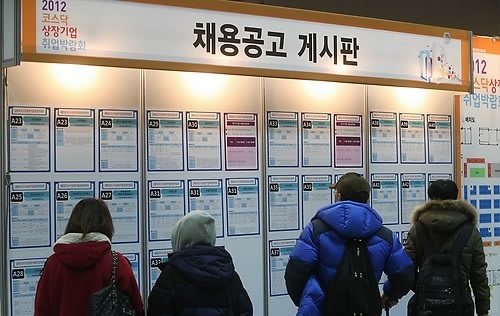
우리나라의 작년 3분기 노동생산성 하락폭이 경제협력개발기구(OECD) 회원국 중 두 번째로 큰 것으로 나타났다.
노동생산성 하락은 금융위기 수준으로 떨어진 경제성장률이 가장 큰 원인으로 지적됐다.
6일 OECD에 따르면 작년 3분기 한국의 노동생산성은 전분기 대비 0.4% 떨어져 22개 회원국 가운데 하락률이 노르웨이(-1.3%)에 이어 2위를 기록했다.
22개국 중 노동생산성이 하락한 국가는 노르웨이와 한국 외에 체코ㆍ포르투갈(각 -0.4%), 핀란드(-0.2%), 이탈리아(-0.1%) 등 6개국뿐이다.
노동생산성은 투입된 노동량과 생산량의 비율로, 노동자 1인이 일정기간 산출하는 생산량 또는 부가가치를 나타낸다.
한국은 작년 3분기 취업자 수가 전분기 대비 0.5% 증가해 노동투입량이 늘어났음에도 실질 국내총생산(GDP)이 금융위기가 한창이던 2009년 1분기와 같은 0.1% 증가에 그치면서 생산성이 하락한 것으로 분석됐다.
OECD 국가들의 3분기 평균 노동생산성은 0.2% 상승했고, OECD 중 유럽 지역 국가들은 평균 상승률이 0.1%를 기록했다.
한국의 연도별 노동생산성 상승률은 2009년 1.6%, 2010년 0.8%, 2011년 0.3%에 이어 2012년에는 3분기까지 -0.1%을 기록, 3년째 뚜렷한 하락세를 보였다.
우리지주금융 송태정 수석연구위원은 "노동생산성 하락은 작년 하반기 GDP 성장률이 급격히 낮아졌기 때문"이라며 "성장률은 둔화하는데 이에 따른 취업자 수 조정은 시차를 두고 나타나기 때문에 노동생산성이 하락한 것"이라고 설명했다.
우리나라는 작년 2분기 단위당 임금이 전분기 대비 3.1% 하락해 OECD에서 두번째로 큰 하락률을 기록했으나, 3분기에는 1.7% 올라 가장 높은 상승률을 나타냈다.
단위당 임금 상승과 노동생산성의 하락에 따라 3분기 단위노동비용은 2.1% 상승, 노르웨이(2.8%)에 이어 두번째로 높았다.
<영문 기사>
Korea suffers sharp decline in labor productivity
Korea posted the second-largest drop in labor productivity among members of the Organization for Economic Cooperation and Development during the third quarter of 2012.
According to the OECD, Korea’s labor productivity fell by 0.4 percent in the July-September period from a quarter before, along with the Czech Republic and Portugal, both of which recorded the same figure.
While Norway saw its labor productivity, or the rate of output per worker per unit of time, fall heaviest by 1.3 percent, two more countries -- Finland (minus 0.2 percent) and Italy (minus 0.1 percent) -- also suffered a drop. Sixteen of the 22 OECD members posted a quarter-to-quarter growth in the index.
Analysts said that the weaker labor productivity in Korea was attributable to a sharp drop in the third-quarter GDP growth.
While the nation saw the number of employees climb 0.5 percent in the third quarter, its economy grew a meager 0.1 percent on-quarter.
On an yearly basis, after undergoing slowed growth of 1.6 percent in 2009, 0.8 percent in 2010 and 0.3 percent in 2011, Korea underwent a 0.1 percent drop for the first nine months of 2012.
A research report from the Ministry of Knowledge Economy also showed that prolonged global recession caused exports to slow and dampened consumer sentiment, which also negatively affected labor productivity.
“Labor input grew at a rapid pace, but production output fell short of expectations,” the report said.
According to the Korea Productivity Center, the nation’s labor productivity “index” took a negative turn in the first quarter of last year, when it stood at 104.6, marking a 2.3 percent drop over the same period of 2011.
For per capita productivity improvement, it is necessary to fuel export competitiveness among small and mid-sized enterprises and to measures to boost sagging private consumption, said economists.
They also advise that subsidies or tax incentives may be offered to companies for investing in programs to increase the work efficiency of their employees.
By Kim Yon-se
(kys@heraldcorp.com)












![[Today’s K-pop] BTS pop-up event to come to Seoul](http://res.heraldm.com/phpwas/restmb_idxmake.php?idx=644&simg=/content/image/2024/04/17/20240417050734_0.jpg&u=)




![[KH Explains] Hyundai's full hybrid edge to pay off amid slow transition to pure EVs](http://res.heraldm.com/phpwas/restmb_idxmake.php?idx=652&simg=/content/image/2024/04/18/20240418050645_0.jpg&u=20240418181020)

![[Today’s K-pop] Zico drops snippet of collaboration with Jennie](http://res.heraldm.com/phpwas/restmb_idxmake.php?idx=642&simg=/content/image/2024/04/18/20240418050702_0.jpg&u=)